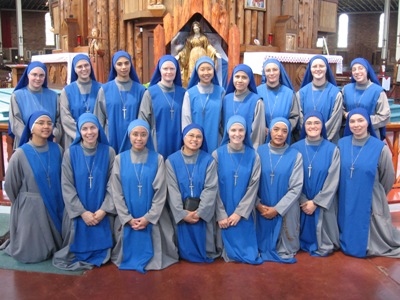Servants of the Lord and the Virgin of Matará
Stages of Formation
This page contains more detailed information about the purpose and nature of each stage of formation. It is important to keep in mind that each stage has a critical role in the development and growth of a sister as a Spouse of Christ. The vocation is not a career requiring a "training period"; it is an entire life spent continually choosing to love and serve God above all other things. It is in formation where a sister first learns to conquer herself and her attachments to the world; for, only by possessing herself she is able to give herself entirely to her Beloved.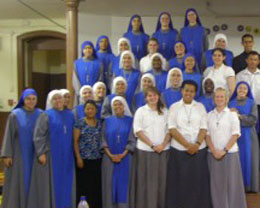
Click on one of the stages below to learn more:
Postulancy Novitiate Juniorate House of Studies Perpetual Vows Ongoing Formation
Postulancy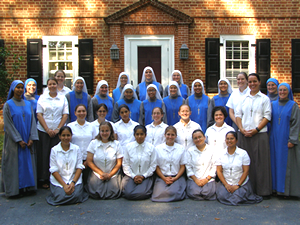
"The Postulancy is realized through means of common life in a house for candidates. The postulancy will be in the charge of one or several sisters, designated by the Superior General, who must know the candidate, her vocation, her suitability, in order to present her to the Novitiate. (Const., 236)."
Novitiate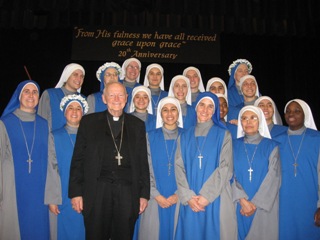
"Life in the Institute begins in the Novitiate. 'The purpose of the novitiate...is to give the novices a greater understanding of their divine vocation. At the same time their resolution and suitability are to be tested (Code of Canon Law, 641-645).' The novices must be properly prepared for the religious profession according to the exigency of the religious life. The Institute studies the candidate in order to receive her into its bosom (Const., 238)."
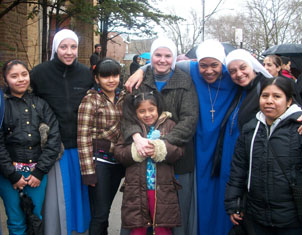 We have Novitiate houses in Argentina, Peru, Brazil, Ecuador, USA, Italy, Ukraine, Egypt and the Philippines. Our Novitiate in the United States was opened in 1999.
We have Novitiate houses in Argentina, Peru, Brazil, Ecuador, USA, Italy, Ukraine, Egypt and the Philippines. Our Novitiate in the United States was opened in 1999.
"The spiritual formation should take primacy in the Novitiate. Intellectual formation is also necessary to prepare the novices to begin with further studies. Pastoral and missionary experiences can be done according to the proper charism of our Institute (Const., 245)."
Juniorate House of Studies
After first profession, "...there begins a new period of religious formation, characterized by the philosophical and theological studies. This is carried out according to the norms of the Canon Law, and the most recent documents of the Magisterium, in order to achieve an authentic integral formation: human, spiritual, intellectual and pastoral formation (Const., 258)."
We have Juniorate Houses in Argentina, Peru, Brazil, Italy, USA, and the Philippines. The Juniorate House in the United States was opened in 2001.
Program of Studies
The program of studies lasts three years. The first two years are spent in the local Juniorate, and in the third year the sisters study at the San Bruno Center for Higher Studies in Segni, Italy run by the priests and sisters of our Religious Family.
Our studies include Philosophy, Theology, Dogmatic Treatises, Sacred Scriptures, Spirituality, Church History, and a language program.
- Philosophy: Introduction to Philosophy; History of Ancient & Medieval Philosophy, History of Modern & Contemporary Philosophy; Logic, Cosmology (Philosophy of Nature), Philosophical Anthropology, Gnoseology (Philosophy of Knowledge), Metaphysics.
- Theology: Fundamental Theology: De Revelatione, De Vera Ecclesia; Fundamental Moral Theology, Special Moral Theology (Cardinal and Theological Virtues), Social Doctrine, Theological Anthropology; Dogmatic Treatises of Deo Uno, Deo Creante, Deo Trino, De Verbo Incarnato, De Sacramentis; Eschatology, Ecclesiology, and Mariology.
- Sacred Scripture: Introduction to the Sacred Scriptures (Principles of Biblical Studies); New Testament Exegesis: Synoptic Gospels, Gospel of St. John, Letters of St. John and Revelation, Letters of St. Paul; Old Testament Exegesis: Pentateuch, Prophets, Wisdom Literature.
- Spirituality: Spiritual Theology, Vita Consecrata (Theology of Consecrated Life)
- History of the Church: Early and Medieval, Modern and Contemporary
- Language Program: Latin and Spanish.
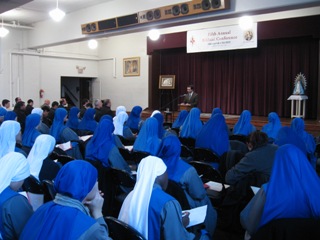
Preference for St. Thomas Aquinas
In #227 of our Constitutions we see how our Juniorate program gives special "...preference to the works of Saint Thomas Aquinas, because we have to be formed 'under his magisterium, (Cf. Optatam Totius, 16)' and hold him 'principally as teacher (Code of Canon Law, 252)' for the following reasons:
- He 'illumined the Church more than all the other doctors. In his books, one profits more in only one year than in the study of all the others during his whole life (John XXII, Allocution in the Consistory, June 14, 1323).'
- He 'most venerated the ancient doctors of the Church, in a certain way he seems to have inherited the intellect of all (Cajetan, Commentary on Summa Theologiae, II-II, 148, 9, 4. Quoted by Leo XIII, Aeterni Patris, 10).'
- The 'Church has proclaimed that the doctrine of Saint Thomas is her own (Benedict XV, Fausto Appetente Die, 4b).'
- God has willed that by the strength and truth of the doctrine of the Angelic Doctor 'all the heresies and error that would follow will be driven away, confounded and condemned. (Saint Pius V, Mirabilis Deus, cf. Leo XIII, Aeterni Patris, 13)'
- His knowledge is of undeniable and fundamental importance for the right interpretation of Sacred Scriptures, so to transcend the sensible and to reach union with God; to build the edifice of Sacred Theology upon the solid basis provided by a profound knowledge of the philosophy of being -- 'a philosophical patrimony perennially valid. (Code of Canon Law, 251)' We also need to keep in mind all the advances of philosophical investigation."
After six years of temporary profession, the religious requests to make her perpetual profession of vows. The previous stages of formation and 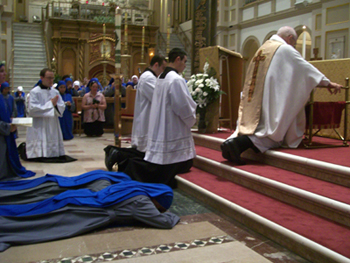 the six years of temporary vows are all ordained to the perpetual vows, so that by the time a sister reaches this point she may be ready and able to commit her entire self to Jesus Christ forever.
the six years of temporary vows are all ordained to the perpetual vows, so that by the time a sister reaches this point she may be ready and able to commit her entire self to Jesus Christ forever.
During the Mass of perpetual profession, the religious prostrates herself before the altar while a sacred litany of saints is prayed. This prostration is an acknowledgement of our complete unworthiness and utter helplessness before the sublime vocation to which we have been called. The religious knows that it is only God Himself who could have lifted her so far above her own nature to be able to call God her Spouse.
Religious life is a process of conti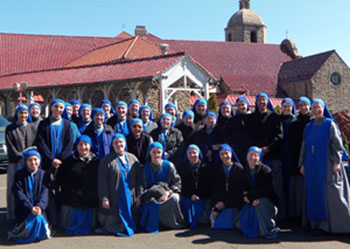 nual conversion that does not finish in the years of formation, but must be maintained and must grow more every day (Const. 262). In the 1990 document of the Congregation for Institutes of Consecrated Life and Societies of Apostolic Life, Directives on Formation in Religious Institutes, we read: "'to follow Christ' means that one is always on the road, that one is on one's guard against sclerosis and ossification, in order to be able to give a living and true witness to the Kingdom of God in this world." In the years following final vows the sisters continue to study and to grow in the richness of religious life until the final encounter with Christ the Bridegroom.
nual conversion that does not finish in the years of formation, but must be maintained and must grow more every day (Const. 262). In the 1990 document of the Congregation for Institutes of Consecrated Life and Societies of Apostolic Life, Directives on Formation in Religious Institutes, we read: "'to follow Christ' means that one is always on the road, that one is on one's guard against sclerosis and ossification, in order to be able to give a living and true witness to the Kingdom of God in this world." In the years following final vows the sisters continue to study and to grow in the richness of religious life until the final encounter with Christ the Bridegroom.
